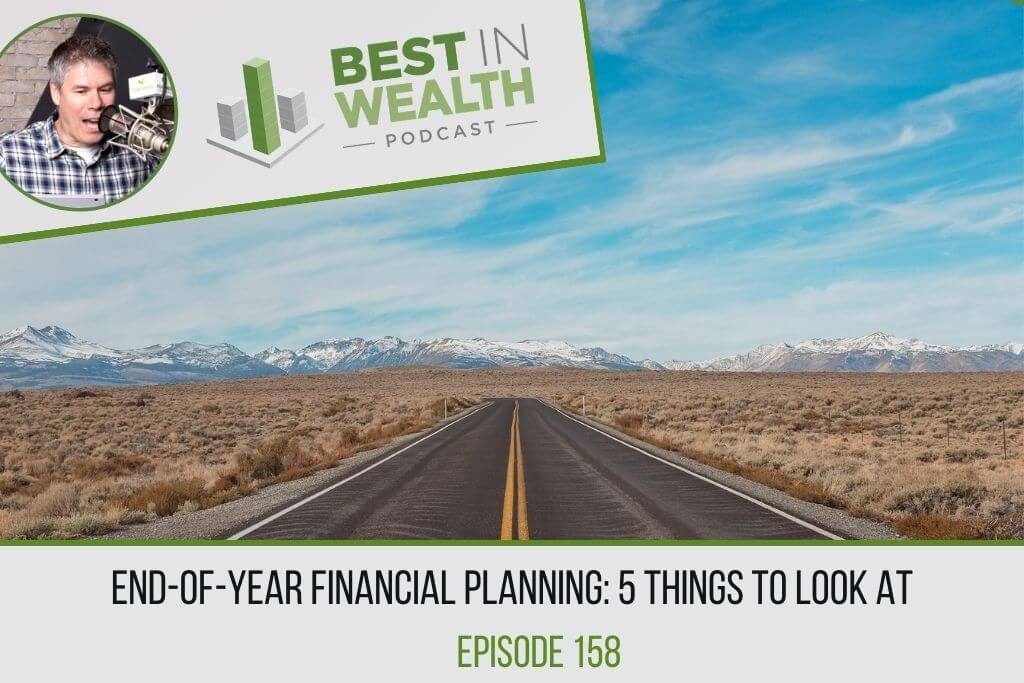End-of-Year Financial Planning: 5 Things to Look at, Ep #158

What five major areas should you look at at the end of every year? End of year financial planning should include looking at assets and debt, tax planning, cashflow issues, insurance planning, and estate planning. Why does it matter? How can it help you from a tax-saving standpoint? Learn more in this episode of the Best in Wealth podcast!
In this episode of Best in Wealth, I share 5 things you NEED to look at in your end of the year financial planning. Check it out! #wealth #retirement #investing #PersonalFinance #FinancialPlanning #RetirementPlanning #WealthManagement Click To TweetOutline of This Episode
- [1:08] Why you need an investment policy statement
- [8:00] #1: The asset/debt issues to consider
- [9:45] #2: Tax planning issues
- [15:17] #3: Cashflow issues
- [17:11] #4: Insurance planning issues
- [18:52] #5: Estate-planning issues
Why you need an investment policy statement
Are you staying disciplined and staying in the stock market? Are you staying disciplined in each asset class? An investment policy statement can help you stay disciplined. The S&P 500 is doing quite well with a few companies driving them forward. People have started moving out of other asset classes to capture some of the returns of the S&P 500. But that is not sticking to your plan.
In the current quarter, small-value is up 27%. Small companies are up 21% and large value is up 17%. You missed out on these asset classes recovery if you got out of these funds and moved to an S&P 500 fund. An investment policy statement will keep you disciplined through the good and the bad times. It puts YOU in control.
The asset/debt issues to look into
Do you have unrealized investment losses? If you have a taxable account and you did tax-loss harvesting, it means you have some losses generated in the account. What can you do? You can look at where you might have selling opportunities to offset the losses with gains (and offset the taxes). If you carry those losses, you’re allowed to write off up to $3,000 each year. You can deduct this from your regular income. If you generated $9,000 of losses in your taxable account, for the next 3 years you have a $3,000 deduction because the loss carries forward. It’s a great way to offset gains or carry forward and offset income.
What asset/debt issues should you look into as part of your end of the year financial planning? I share some thoughts in this episode of Best in Wealth. Go check it out! #wealth #retirement #investing #PersonalFinance #FinancialPlanning… Click To TweetTax planning: How to save on your taxes
There are so many things you can do to save on your taxes. Do you expect your income to increase in the future? Many people were victims of the pandemic and lost their jobs. If you are one of those people, it means you will not make the kind of money you would normally make. Your taxable income may be lower than it ever has been. If you are in this situation, now might be the time to contribute to a Roth IRA. Why? Because you are in a lower tax bracket. If your tax bracket is lower this year, consider doing a Roth conversion. The money starts growing tax-free.
If you make around the same amount as you have previously, are you on a threshold of a tax bracket? We live in a progressive tax system, which means the first $19,750 you make is taxed at 10%. If you make more than that, you are taxed at 12%. If you make more than $80,250, you are taxed at 22%—which is a huge jump. So how do you stay in the lower tax bracket? You could fully fund your HSA or your 401k. Anyone on a threshold should make the same maneuvers if you have the money to do so. What else can you do? Listen for a few other tax-planning savings ideas! I also share some ideas to mitigate cashflow and insurance issues—don’t miss it.
Estate-planning [unexpected things you can do]
One of the big things you need to look at is your beneficiaries. Did you have a baby? Do you want to remove someone? Are your personal representatives still the right people? Is your financial power of attorney correct? Make sure it is all exactly the way you want it.
Secondly, if your net worth is growing and you want to give away some money now, you can gift up to $15,000 per person tax-free. You get about a $12 million exemption. The downside is that the government can change this law at any time and lower that amount. As you start getting older and you do not plan on spending all the money in your portfolio, wouldn’t you want to see the joy in someone’s eyes while you are still living?
What are some unexpected things you can do with estate-planning? Find out in this episode of Best in Wealth! #wealth #retirement #investing #PersonalFinance #FinancialPlanning #RetirementPlanning #WealthManagement Click To TweetResources Mentioned
Connect With Scott Wellens
- Schedule a discovery call with Scott
- Send a message to Scott
- Visit Fortress Planning Group
- Connect with Scott on LinkedIn
- Follow Scott on Twitter
- Fortress Planning Group on Facebook
Podcast Disclaimer:
The Best In Wealth Podcast is hosted by Scott Wellens. Scott Wellens is the principal at Fortress Planning Group. Fortress Planning Group is a registered investment advisory firm regulated by the Securities Act of Wisconsin in accordance and compliance with securities laws and regulations. Fortress Planning Group does not render or offer to render personalized investment or tax advice through the Best In Wealth Podcast. The information provided is for informational purposes only and does not constitute financial, tax, investment or legal advice.



